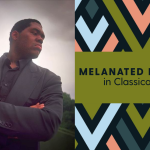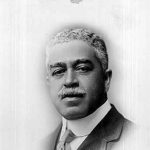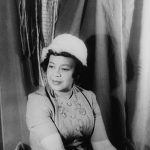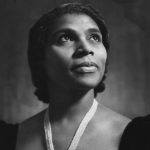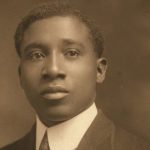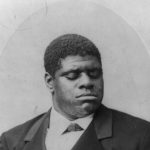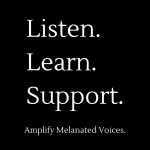Melanated Moments, S1E4: Kitchen Table Masterpiece – A Woman’s Life
In this episode of Melanated Moments, Angela gives us an inside look at the making of a masterpiece. She tells us how composer Richard Danielpour worked with literary legend Maya Angelou to set a number of poems for the iconic song cycle, A Woman’s Life. Angela tells us of her once-in-a-lifetime opportunity to perform in Miss Angelou’s own home, a performance that moved her to tears.
Featured Music:
“Life Doesn’t Frighten Me At All,” “They Went Home,” and “Many and More” from A Woman’s Life by Richard Danielpour, performed by Angela Brown and the Nashville Symphony Orchestra
Music Plays (00:05): [MMCM Theme] Joshua Thompson (00:14): Welcome everybody to another episode of Melanated Moments in Classical Music. I’m Joshua Thompson…. Angela Brown (00:22): And I’m Angela Brown. Joshua Thompson (00:24): So on the last episode, we introduced you all to the amazing opera, Margaret Garner, composed by Richard Danielpour. And today we’re going to keep that rolling with Mr. Richard. But on this episode, we’re going to take you inside the creative process, which is somewhat a little bit different, right? Because the song cycle we’re going to discuss was written for Ms. Angela Brown, here. So Angela, how did you come about to do that? Angela Brown (00:52): You know, anyone that knows me knows that, um, I’m not a shrinking violet. So I remember Richard and I had struck up a rapport with one another and I just off the cuff one day– and this is serious, off the cuff one day– I just said, “Hey, Richard, uh, have you ever thought about maybe writing a song cycle and writing it for me?” Joshua Thompson (01:17): Right! Say, my mom said it is a pitiful dog that will not wag his own tail– Angela Brown (01:21): Well!… Joshua Thompson (01:21): If you don’t bark, you don’t get fed– all those things. Ya know, I ain’t mad at ya. Angela Brown (01:26): So then he said, let me think about that. And so he did, and then we set up an appointment and we went to a restaurant right across the street from the Metropolitan Opera in New York City. And we were sitting there in a booth that he, evidently later on told me that it was the same booth– I can’t remember the name of the restaurant now– Um, I think it was Josephine’ s or something like that. I’m not sure! Don’t quote me, but don’t fact check that. But he said, “This was the same booth that I sat in with Toni Morrison, and I wanted to talk in this same booth with you about this probable song cycle.” So he said, “So who did you want to do the libretto?” And I was like, “Oh, Maya Angelou.” I was like, “If I have a choice”, I was like, “we’ve already had Toni Morrison. Why not?” Maya Angelou, get them all, get them all in. And he says, “Exactly, that’s exactly who I was thinking of”. Joshua Thompson (02:23): No way! Angela Brown (02:23): I was flabbergasted, just– Joshua Thompson (02:24): Instantly were on that same page. Angela Brown (02:26): –on the same page. And so he talked to Dr. Angelou. Dr. Angelou said, “Well, I’ve already written those.” And he was like, “Well, where are they?” She said, “They’re in my collected works.” And he sets seven of them, and it’s called, A Woman’s Life. Joshua Thompson (02:41): So I was actually able to find an interview where Richard Danielpour tells the story. And– obviously he mentioned you and your conversations, but then he goes on to talk about reaching out to Dr. Maya Angelou, herself. And it’s just fascinating to hear about. Richard Danielpour [Interview audio] (02:58): Well, this is an interesting story because I had originally wanted to write something for Angela Brown. And when we got around to talking about texts, she– without hesitation– said, “Oh, if you could set Maya Angelou, that would be fantastic.” And I said to her, “Well, I happen to know Maya Angelou.” And in fact, I was planning on paying her a visit. So I went, then, with this idea. And as we– as I had talked to Angela, the idea of writing a kind of cycle involving a woman’s life and dealing with the life cycle– essentially, childhood to old age, like the Schumann cycle, but American. So I went to Dr. Angelou, and I brought Kathleen, we talked. And I said, “Would you be interested– or willing– in writing some poems for me?” And she said, “I have them, my dear, I have them. They’re already done.” And so she had one of her assistants produce a copy of her collected poems and put the book on the little stand, and holding our hands, at her dining room table, she read eight poems. And I have to say, it was one of the greatest performances I have ever witnessed. I’ll never forget it. Joshua Thompson (04:17): Just– wow! So what I think is so interesting is the way he describes that performance from Maya Angelou, because Maya Angelou performed everywhere. Angela Brown (04:27): Yes!– Joshua Thompson (04:27): Her kitchen table– Angela Brown (04:28): She did! Joshua Thompson (04:28): It doesn’t matter– it was a performance! To me– I just find that to be unbelievably powerful and the whole point– not just of this show, but I don’t know– my passion and love for what we do and yours too, clearly. Angela Brown (04:40): And from having that experience, I had the opportunity then to travel to Maya Angelou’s home. Joshua Thompson (04:48): So you’ve been… Angela Brown (04:49): I’ve been to Maya Angelou’s, honey. She has cooked for me, and I slept in her house. She insisted that me and my mother cancel our hotel arrangements and stay with her in her home. And I sang these pieces for her in her living room, and she cried and she wept. And she said, “You have gotten butter from a duck today.” Meaning: she normally does not show a lot of emotion, but she cried that day. She wept. And she says, “You are singing my heart. You are singing what I heard and what I felt.” And because of Richard’s beautiful music, I mean, she was able to experience this. And, uh, it was such a great honor. Joshua Thompson (05:33): Well, if the late great Maya Angelou– what’d you say, butter from a duck? Angela Brown (05:38): Butter from a duck, Josh, what you said! Joshua Thompson (05:39): Let’s–let’s talk about the butter and the duck. Let’s get into it. Let’s get into it! Uh, so the song cycle– there are, what seven movements? Angela Brown (05:48): They’re seven movements– Joshua Thompson (05:48): So, it’s accessible, right? They’re short. Angela Brown (05:50): Very. Joshua Thompson (05:51): You can listen to them by themselves or as a whole.. Angela Brown (05:53): They’re like– twenty-two minutes. Joshua Thompson (05:54): So, A Woman’s Life. Who’s life, any woman’s, yours?– Angela Brown (06:01): It could be any woman’s life. And you can see yourself in almost all of them. I often, when I perform these, I normally perform the first four, because those are the ones I feel closest to. But as I have begun to matriculate through life and gotten closer to the other half of the cycle, um, I know I’m going to begin to end up singing the– incorporate all the pieces. Joshua Thompson (06:27): Okay. So, you usually just sing four of the pieces. So tell us about them starting with the first one. What is it called? Angela Brown (06:36): Little Girl Speakings. This a little girl that’s speaking about– No, no. It starts off: “Ain’t nobody better than my daddy.” Then she speaks about her dolly and her mama’s cooking. Okay. Joshua Thompson (06:47): And not to touch her doll’s hair. Angela Brown (06:48): Don’t touch her doll’s hair. Joshua Thompson (06:49): So, that’s a little Black girl, because from the beginning of the cycle to the end: don’t touch… Our hair! Angela Brown (06:56): Exactly, No! And then, you know, she’s– she’s saying “Ain’t nobody better than my daddy”, and somebody is trying to give her a quarter. She says “You keep your quarter. I ain’t your daughter.” Don’t be trying to snatch me up! There’s a whole lot, you know, in there; whole lot going on. Joshua Thompson (07:13): Okay. Well, let’s hear what it sounds like. Music Plays (07:15): [“Little Girl Speaking,” sung by Angela Brown]. Joshua Thompson (07:55): That’s wonderful. It’s so precious. So then what’s next? Angela Brown (07:57): Life Don’t Frighten Me at All. I mean, I see this as a young adolescent girl, who’s probably just lost a tooth, and she’s got on some dungarees and that’s an old throwback, dungarees– jeans! Joshua Thompson (08:09): Yes it is. That’s alright though– depending on where our listeners are and their cycle, they go get it or they can read about it later. Angela Brown (08:19): There you go! And she’s saying shadows on the wall, noises down the hall, life doesn’t frighten me at all. She just talks about all these different things that are going on in her little compartmentalized life. Joshua Thompson (08:33): There’s a line in there, um, that I really love. And I’m a paraphrase it, but it’s something to the effect of: she’s a very fearless, and she’s not afraid of anything. The only time that you see her scared is in her dreams, which I think is just– Angela Brown (08:46): Maybe, in her dreams. Joshua Thompson (08:49): Maybe in her dreams! It’s almost a “fake it till you make it”, or “I’m not going to let you see me sweat”, or as we say, “we ain’t sweatin’ them today”. Angela Brown (08:56): That– not today. Joshua Thompson (08:57): None of them. Music Plays (08:58): [“Life Don’t Frighten Me at All,” sung by Angela Brown] Angela Brown (10:42): And then there is the one that I don’t relate to at all– Joshua Thompson (10:47): I didn’t know where you were goin’ with this… Angela Brown (10:50): Mhmm– called, “They Went Home”. Joshua Thompson (10:51): Give us the quick rundown of “They Went Home”. Uh, yes, let us know. Angela Brown (10:57): “They Went Home” is, I imagine– this a young woman, uh, ingenue that’s feeling herself, and she’s looking for love and all the wrong places, and faces– Joshua Thompson (11:10): Every place and every face! Angela Brown (11:13): And faces that don’t belong to her. Okay. Joshua Thompson (11:16): Oh, okay. Angela Brown (11:17): Because I think the first line is “They went home…and told their wives”! Music Plays (11:23): [“They Went Home,” sung by Angela Brown] Joshua Thompson (11:32): Who does that though– [laughter]! She was– Angela Brown (11:36): Honey, she was bold with it, that: Never once, in all their lives, had they met a girl like me, honey! Joshua Thompson (11:46): But– Angela Brown (11:46): But… They went home. Music Plays (11:50): [“They Went Home,” sung by Angela Brown, continued…] Angela Brown (11:53): So, you know, they’re finding fancy and wonderment with her– for a moment. Joshua Thompson (11:59): So it’s like– like Sidepiece Soliloquies, you know? Yeah. Tunes in the key of sidepiece. Here’s my– going to be perfectly honest. No judgment here, whatsoever. We didn’t write it. Angela Brown (12:13): No. Joshua Thompson (12:13): We’re just telling it like it is. And not to bust out business of anyone– But for me, I prefer to remain an entree. You can’t get me al la carte. But– Angela Brown (12:22): Alright! Joshua Thompson (12:22): But for some folks, you know–They went home. Angela Brown (12:23): So that’s what that piece is about. Joshua Thompson (12:30): I gotta be honest with you. I was not all that familiar with the composer and or the set of works that you’ve picked. However, I’ve been listening to it a lot over the last couple of days and with A Woman’s Life, that song cycle, there’s such a sweet nuance that he teases out, uh, the softer movements– Angela Brown (12:54): Oh yes. Joshua Thompson (12:53): Just gorgeous! Angela Brown (12:53): And you feel the growth, the maturity of a woman, as it goes down the cycle. And by time you get down to Many and More, this is a woman that has lived life. She feels good in her skin, and she’s just opening up. And she’s like, “There are many and more who would take my hand, kiss my lips to my loneliness, lend their bodies warmth. I’m in need of a friend”. She has gotten to the point where she has loved many and lost many, and now she’s just looking for someone to be with her and hold her hand at the end of life. Joshua Thompson (13:35): Right. Angela Brown (13:35): And it– it’s beautiful. Music Plays (13:44): [“Many and More,” sung by Angela Brown] Joshua Thompson (14:43): The progression from the beginning, you know, the first couple of movements it’s, uh– the voice and the orchestra are very much harmonious, but by the time– like you’re saying–you’re getting to the end of the song cycle, the orchestra really kind of takes a back seat. And it becomes so much more, even more so, about how you express the words and the words themselves. You can hear them way more articulately because there’s not so much going on, which I think is kind of a nice little musical metaphor for life cycles and seasons and all that. Angela Brown (15:15): You calm down. Joshua Thompson (15:16): Right? Angela Brown (15:18): You start to strip off all of that extra shiggity– Joshua Thompson (15:21): All that unnecessary– Angela Brown (15:23): Unnecessary stuff that you felt like you had to have. Then it’s like: the simplicity of life. Let me just have a bowl of beans and some hot water, corn bread. Oh, I am happy. I don’t need filet mignon anymore. Joshua Thompson (15:35): Not today. Angela Brown (15:36): Not today. Joshua Thompson (15:36): Not today. Lots of vocal gymnastics going on in this too. Can you do this work if you don’t identify with it? Angela Brown (15:43): Well, I mean, with any new piece of music that you pick up to do, you, first of all, want to be able to vocally do it. You know, so you want to look and see if this is something that you can vocally do. And then reading the poetry, letting it wash over you. Cause we are singing actors. So anybody could sing this and put themselves into a character because I perform this very much in the characters that are being presented– the little girl, the ingenue that’s– Joshua Thompson (16:16): The few videos I’ve seen, you have a very lively performance, and it’s not just from the vocal gymnastics, but your face, your whole body is… in it– Angela Brown (16:23): You have to get in it. Joshua Thompson (16:24): — And It’s exciting to watch, It is. Nice! So I gotta be honest with you. You definitely turned me onto something new– someone new, has me super excited to learn more of his works because there are several. So this was really special. You came up with a really good one! Angela Brown (16:37): Well, I just hope you all will enjoy the works of Richard Danielpour. He’s a fantastic composer, and Margaret Garner and A Woman’s Life are just scratching the surface of what he has to offer. Joshua Thompson (16:54): So if it’s a rabbit hole, you choose to dive down, we wish you godspeed. Have fun. Tell us all about it. When you get back, I’m Joshua Thompson… Angela Brown (17:03): I’m Angela Brown. Unison (17:05): And this has been your Melanated Moment in Classical Music. End Credits (17:13): Melanated Moments in Classical Music is a production of Classical Music Indy. Our Producer is Ezra Bakker Trupiano. Our production intern is Auboni Hart. Our theme music was composed by Laura Karpman. Melanated Moments in Classical Music is proud to partner with CAAPA, the Coalition for African-Americans in the Performing Arts; supporting black classical musicians, opera singers, youth and others in the performing arts by bringing color to the classics. Learn more at four –that’s, the number 4caapa.org. Classical Music Indy- The Streaming and Podcasting is made possible by the Allen Whitehill Clowes Charitable foundation. Melanated Moments in Classical Music is proud to partner with Morning Brown Incorporated; working to bridge the gap between accessible, live music programs and underserved individuals, schools, and communities where the offering of classical music is rare or the cost of experiencing classical music is prohibitive. Learn more at morningbrown.org. Music Plays (18:28): [MMCM Theme].
[/su_tab] [su_tab title=”Related Blog Posts” disabled=”no” anchor=”” url=”” target=”blank” class=””]LOCAL CLASSICAL – MELANATED MOMENTS SEASON SIX
As we continue celebrating Black Music Month, this week’s playlist will feature music and artists discussed during the latest season of Melanated Moments in Classical Music. All of season six was recently released and featured vibrant discussions about artists such as Scott Joplin, Hazel Scott, Joseph Bologne, and Kenneth Overton, among others.
LOCAL CLASSICAL – BLACK MUSIC MONTH
In this week’s playlist, we celebrate Black Music Month which takes place in June. It was created by President Jimmy Carter in 1979 to honor and celebrate Black artists’ contributions to music. We’ll be honoring the late Herman Whitfield III, an Indianapolis native who was a gifted pianist and composer. We’ll also hear performances of artists who have been featured in season four of Classical Music Indy’s podcast, Melanated Moments in Classical Music.
LOCAL CLASSICAL – MELANATED MOMENTS
In this week’s Black History Month playlist, we bring you recordings by composers, performers, and artists who have been highlighted in our podcast, Melanated Moments in Classical Music. Melanated Moments is the ward-winning podcast from Classical Music Indy that shines a spotlight on musical works composed by, for, and about Black people.
LOCAL CLASSICAL – HOST OKARA IMANI
Hey, Starshine! This is Okara Imani, Media Production Fellow for Classical Music Indy, and your guide to The “I” in Classical Music. I’m here to highlight the cultural and social intersections of the classical art form, beyond the Classical Period and beyond the constructs of Euro-centric high society origins.
Ric’key Pageot: Inspiring a Moment to Learn, Acknowledge, and Respect
Ric’key Pageot: Inspiring a Mo …
Ignatius Sancho: Composing the Hypocrisy of Colonialism & Convention
Ignatius Sancho: Composing the …
NEW CLASSICAL – DR. BILL BANFIELD
This week we bring you the music of Dr. Bill Banfield. Dr. Banfield is an award-winning composer whose symphonies, operas, chamber works have been performed and recorded by major symphonies across the country. Few have a wider, performed professional composing output, that has had public concert performances, reviews, radio, recordings of some 12 symphonies, 7 opera, 9 concerti, chamber, jazz, and popular forms. This alone making Dr. Banfield one of the most performed, recorded composers of his generation. In 2010 and 2016, Dr. Banfield served as a Pulitzer Prize judge in American music.
#AmplifyMelanatedVoices
Classical Music Indy stands with our Black community. We are here to listen, learn, and lend our support. We believe that classical music is powerful; that it evokes a range of human emotions and creative expression.
Angela Brown Brings her Unbridled Zeal to a New Podcast.
Angela Brown brings her unbrid …




